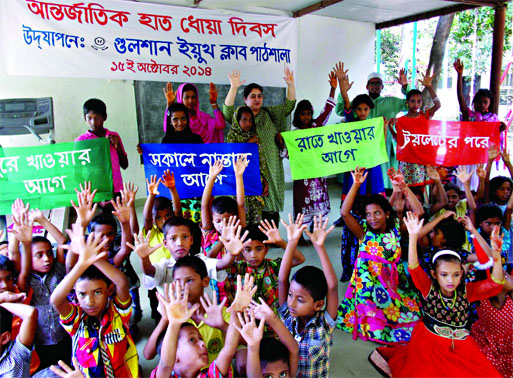
Staff Reporter Experts and officials at a function on Wednesday underscored the need for promoting handwashing with soap to prevent diarrheal and acute respiratory infections, which are major causes of child deaths in Bangladesh. They said handwashing with soap is the most effective and inexpensive way to prevent those diseases. It also can ensure good health for children and elders protecting them from different water-borne diseases.”Providing access to safe water and sanitation facilities, and promoting proper hygienic behavior are important in reducing the threat of these diseases,” they said this at the function held on the premises of Osmani Memorial Auditorium in the capital.The function was organised to mark the ‘Global Handwashing Day’ which coincided with the National Sanitation Month (NSM)-2014 began from Wednesday in the country.Global Handwashing Day (GHD) was observed in over 100 countries around the world aiming to raise awareness of handwashing with soap as a key approach to disease prevention.To mark the GHD and NSM, a colourful rally with participations of officials and employees from different government and non-government organisations was brought out from Jatiya Press Club this morning and it ended at Osmani Memorial Auditorium.Senior Secretary of Local Government Engineering Department (LGED) Monzur Hossain, Chief of Water, Sanitation and Hygiene Section of UNICEF Charlie Hrachya Sargsyan, Chief Engineer of Department of Public Health Engineering (DPHE) Khaleda Ahsan, officials and representatives of different government and non-government organistions, among others, spoke at the function.Monzur Hossain said Bangladesh has achieved a remarkable success in sanitation coverage as 97 per cent households now use latrines while the figure was only 33 per cent in 2003.The number of families using improved sanitation is 57 per cent while 28 per cent households use shared latrines and 12 per cent use unimproved latrines in the country.”Despite considerable progress in sanitation coverage, we have some challenges including geographically vulnerable areas, slum dwellers in urban areas and lack of improved sanitation facilities in different transports systems to attain 100 per cent sanitation coverage in the country,” Monzur added.He said, “We have to improve sewerage system as only 20 per cent people in Dhaka city has been brought under sewerage system and there is no adequate sewerage facilities in other cities.”As part of long-term plan, the government has taken initiatives to expand sewerage facilities in major cities including Dhaka and Chittagong, Monzur said adding, “We are also working to expand offsite sanitation for urban areas and improved sanitation facilities for rural areas aiming to bring all people under sanitation.”Other speakers said every year, more than 3.5 million children aged less than 5 years die from diarrhea and acute lower respiratory-tract infection in developing countries including Bangladesh.These deaths are concentrated in now-income communities in developing countries, they said adding better hygiene practices through frequent handwashing with soap can prevent waterborne diseases saving millions of lives around the world. They said the number of people making open defecation significantly reduced in the past couple of years due to different initiatives taken by the present government, saying now only three percent people defecate in open place in the country. Some communities in Dhaka also observed the day by handwashing demonstrations reciting poems, songs, drama and quizzes to the children.The Day was also observed in union level communities and schools orgainising events like rallies, handwashing demonstrations and discussion sessions. Participants included children, teachers, school management committee members, parents, government officials and other local stakeholders.

